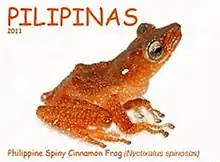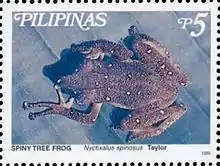Spiny tree frog
The spiny tree frog (Nyctixalus spinosum) is a species of frog in the family Rhacophoridae.[2][3] It is endemic to the Philippines and occurs on Mindanao, Leyte, Bohol, and Basilan,[2] possibly wider.[1][3]
- "Spiny Tree Frog" is also used for Litoria spinifera from New Guinea.
| Spiny tree frog | |
|---|---|
 | |
 | |
| Scientific classification | |
| Domain: | Eukaryota |
| Kingdom: | Animalia |
| Phylum: | Chordata |
| Class: | Amphibia |
| Order: | Anura |
| Family: | Rhacophoridae |
| Genus: | Nyctixalus |
| Species: | N. spinosus |
| Binomial name | |
| Nyctixalus spinosus (Taylor, 1920) | |
| Synonyms | |
| |
Description
Males measure about 35 mm (1.4 in) and females about 41 mm (1.6 in) in snout–vent length. The body is elongated, tapering from the temporal region. There are prominent spinose tubercles on all dorsal surfaces, especially on the eyelids. The tympanum is distinct. The colouration is brown about with some yellow spots, and yellow or orange below. Fingers are unwebbed but toes have some webbing. Males have nuptial pads but appear to lack vocal sacks.[4]
Habitat and conservation
Its natural habitats are montane and lowland rainforests. It is a forest floor species that lays its eggs in tree holes. It is threatened by habitat loss caused by agriculture and human settlement.[1]
References
- IUCN SSC Amphibian Specialist Group (2020). "Nyctixalus spinosus". IUCN Red List of Threatened Species. 2020: e.T26156A176743176. doi:10.2305/IUCN.UK.2020-3.RLTS.T26156A176743176.en. Retrieved 16 November 2021.
- Frost, Darrel R. (2016). "Theloderma spinosum (Taylor, 1920)". Amphibian Species of the World: an Online Reference. Version 6.0. American Museum of Natural History. Retrieved 16 February 2016.
- "Theloderma spinosum". AmphibiaWeb: Information on amphibian biology and conservation. [web application]. Berkeley, California: AmphibiaWeb. 2016. Retrieved 16 February 2016.
- Inger, Robert F. (1954). "Systematics and zoogeography of Philippine amphibia". Fieldiana: Zoology. 33 (4): 183–531. (pages 407–409)
